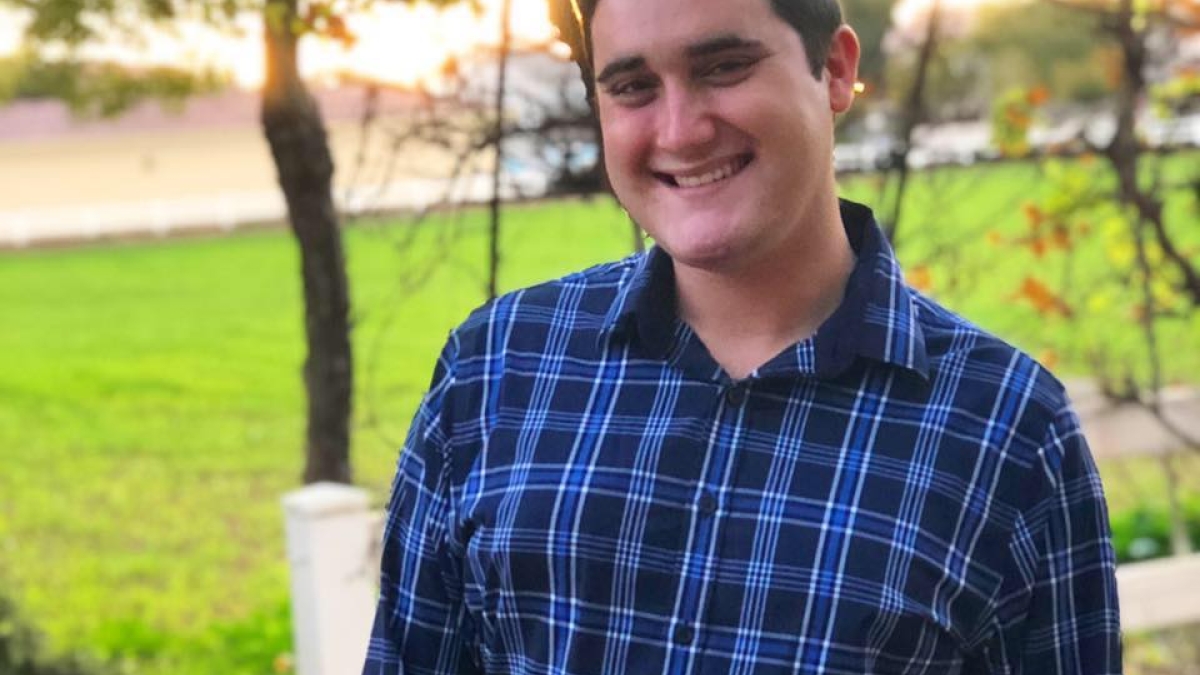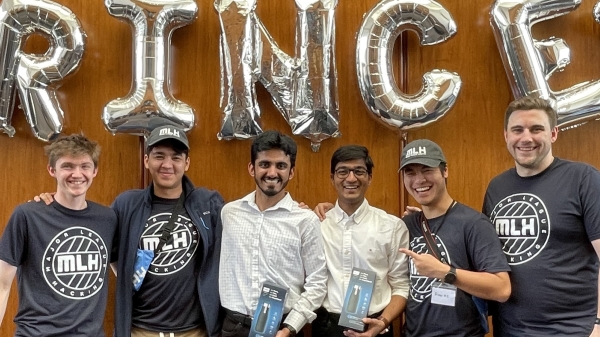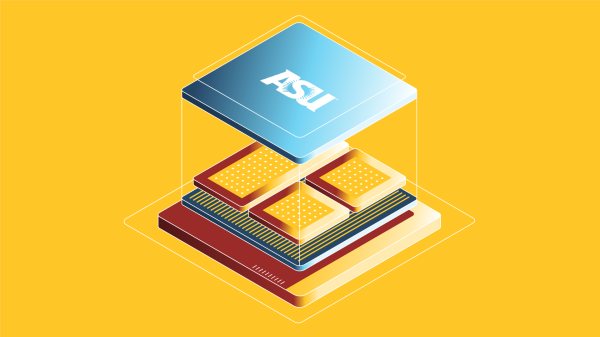Barrett graduate found his passion for community involvement, student engagement at ASU

Fall 2018 graduate Joshua Albin.
Editor’s note: This is part of a series of profiles for fall 2018 commencement. Read about more graduates.
Joshua Albin, from San Jose, California, graduated on Dec. 10 from Arizona State University with a bachelor’s degree in software engineering and honors from Barrett, The Honors College at ASU.
Throughout his four years at ASU Albin was the epitome of an involved student.
In addition to studying for his engineering degree, Albin was busy working as the Barrett Honors College front desk assistant at the Polytechnic campus, serving as president of the Polytechnic Programming and Activities Board, engaging with prospective students as a member of the Honors Devils student recruitment team and as a Devils’ Advocates tour guide.
He also was active in the Barrett Honors College Council, Undergraduate Student Government, the Dancin’ Devils, College Against Cancer, ASU Performing Arts Club and Inferno Outsiders. He spent summers working for engineering firms in California.
He received several awards for his involvement in the Barrett and ASU communities, including the Devils’ Advocate of the Year, Outstanding Honors Devil, Barrett Polytechnic Community of Scholars Award, Most Spirited Award, Hardest Working Barrett Student Award, and Outstanding Honors Devil Newcomer at Poly Award. He was nominated for the Sun Devil Spirit Award and the Community Impact Award.
In recognition of his devotion to Barrett and his community involvement, Albin was chosen to speak at the honors college’s convocation on Monday.
Albin credited the honors college with giving him opportunities to study abroad in Europe, gain lasting friendships, and conduct research for his honors thesis titled “Educating Future Engineers in the Art of Communication through Presenting.”
He encouraged his brethren to use their education and skills to benefit their communities. “We are now Barrett alumni and with that comes responsibility,” he said.
“It may sound corny, but we really are the future,” Albin told his fellow graduates.
Question: What was your “aha” moment, when you realized you wanted to study the field you majored in?
Answer: I originally wanted to study software engineering because both my parents started out in engineering and I thought I wanted to do engineering as well. I chose software specifically because I was interested in computers and wanted to know how they worked. As I went through the courses at ASU, I learned I am not passionate about software and it was not something I wanted to pursue in the industry. It was during my senior year that I figured out that I wanted to work in a different field than what I was studying and I knew this was going to be difficult to explain. I realized that I want to go into a more people oriented field. Even though I am still graduating with a degree in software engineering, I will try to get a job in a field that I am passionate about. I believe that it is totally fine to go into something that you are not studying and that you should do something that makes you happy. If you love what you are studying, that is totally fine as well.
Q: What’s something you learned while at ASU — in the classroom or otherwise — that surprised you or changed your perspective?
A: Through all of my leadership positions at ASU, I have found that student recruitment and student engagement are what I am passionate about. Before ASU, I thought that I was going to get a degree and then get a job in the field of my degree. Now, after attending ASU, I learned that there are so many more possibilities than I thought there were. Being a tour guide with Devils' Advocates and helping with student recruitment with Honors Devils, I learned that showing and telling prospective students why they should come to ASU is something that I love to do. By planning events with the Programming and Activities Board and helping advocate for students with Undergraduate Student Government, I learned that student engagement is something that I am also passionate about. I never thought I would join these types of clubs when I first started at ASU, but I am glad I did because it has shaped who I am today. My experiences with these organizations and clubs have showed me the possibilities that are out there.
Q: Why did you choose ASU?
A: I chose ASU solely because of Barrett, The Honors College. I cannot say enough about Barrett and what it has done for me. I love that it offers more opportunities and levels of support for students. I have been able to do so much with Barrett: studying abroad in Paris and Berlin, working with faculty and staff that care about me, planning and attending events geared towards my interests, gaining invaluable skills through leadership positions, and, my favorite, meeting so many amazing people that I will cherish forever. We think of each other as family and we help each other out when we can. I have loved all of the experiences and memories I will take away from an amazing honors college.
Q: Which professor taught you the most important lesson while at ASU?
A: One of my favorite professors of all time is Dr. Thomas Martin. He was my human event professor my freshman year and my second reader for my honors thesis my senior year. He has always challenged me to think deeper and more critically about whatever topic I am working on. During my freshman year, he helped me explain and articulate my ideas more effectively and more thoroughly. As a member of my thesis committee during my senior year, he helped me go further than I thought I was capable of and make something I am really proud of. He even would check in with me time to time to see how I was doing and often offered advice for whatever I was dealing with. He is always someone I can count on to have my best interests at heart and is a neutral party when making decisions.
Q: What’s the best piece of advice you’d give to those still in school?
A: I would say to current ASU students that you should find something you love and pursue it. It does not matter what other people think. You should be happy. Also, you should take advantage of the opportunities while you are in college: join a club, travel abroad, try something new, etc. This is the only time in your life you will have this many different things available to you, so go out an experience them. It does not hurt to try.
Q: What are your plans after graduation?
A: Right now I am still trying to find a job, but I would love to work for ASU within student recruitment and/or student engagement. I want to continue my passion at a place that I call home.
Q: If someone gave you $40 million to solve one problem on our planet, what would you tackle?
A: One of the biggest issues in the world is poverty. $40 million is a start. I think first getting people in third world countries basic supplies for food, clean water, shelter and health care are essential. Next, trying to help them get education tools so they can learn and grow is important. It is easy to get wrapped up with our own problems and struggles in the first world, but helping people without our privileges is a step in the right direction.
More Science and technology

National Humanities Center renews partnership with Lincoln Center for responsible AI research
The National Humanities Center has announced that Arizona State University's Lincoln Center for Applied Ethics is one of four…

ASU student and hackathon enthusiast explores bridge between humanities, technology
While science and the humanities are seemingly two completely different worlds, the truth is they often go hand in hand. Mannan…

Advanced packaging the next big thing in semiconductors — and no, we're not talking about boxes
Microchips are hot. The tiny bits of silicon are integral to 21st-century life because they power the smartphones we rely on,…